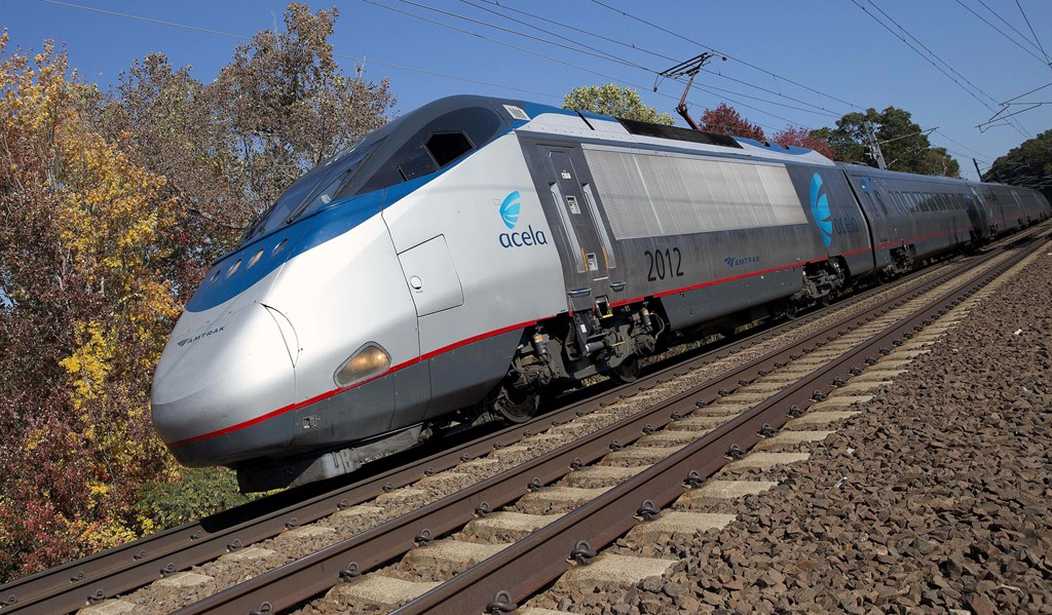Late Friday night the House, with the help of 13 Republicans, passed the $1.2 trillion infrastructure bill. As it turns out, though, it's missing a key provision when it comes to climate.
As Tanya Snyder wrote for POLITICO on Saturday, the final version "falls far short of Biden's original vision, which promised to dramatically reduce the climate impacts of transportation, the single largest source of pollution. In the end, the final product was the victim of the bipartisan focus it took to get the bill done and is an example of the razor thin governing majority Democrats must navigate."
She went on the write that even with what's in the infrastructure and reconciliation spending bills "do not approach how Biden promised to move the nation toward carbon neutrality and zero emission vehicles soon after he took office."
Snyder also addresses Amtrak, which was trending over Twitter on Saturday. In a subheading of "Amtrak supercharged," she quotes an expert who warns not to get too excited:
But Sean Jeans-Gail, vice president for the Rail Passengers Association, a passenger rail advocacy group, said while welcome, it won't be enough to create a true transformation in the country's passenger rail system.
The bill could enable Amtrak to boost its frequency and reliability across its network, but Jeans-Gail said it won't be enough to start "launching something from nothing," like new service corridors. He noted that much of the money could be eaten up with basic maintenance needs like track upgrades, upholstery of train cars and station ventilation. It will also fund studies and corridor identification exercises that will then need even more funding to carry out, he said.
“I think a lot of what we’re going to fund [with the infrastructure package] is environmental review, route analysis, coming up with a national concrete plan and doing design work and start constructing the corridors," Jeans-Gail said. "And there needs to be that next package to bring home a lot of that planning work, a lot of that environmental work, a lot of that design work.”
He noted that given "these goals that we still have to decarbonize the transportation sector and to get as many people on to mass transit as possible ... we’d hoped for more.”
Despite the large figures, it could take months or even years to start seeing shovels in the ground, as regulators eager to avoid comparisons to former President Barack Obama's stimulus program focus on good projects rather than immediate projects. The current labor shortage, compounding longtime workforce issues in the construction trades, could also slow down the pace of building and make projects more expensive, experts warn.
This is an administration that is laser focused on addressing what it calls the "climate crisis." It is so inherently devoted to climate and climate only that Climate Czar John Kerry has admittedly dismissed addressing China's human rights abuses and acts of genocide so that the Chinese Communist Party (CCP) will be more open to a discussion where they'll pretend they're going to try harder to reduce emissions.
Recommended
During a meeting with Chinese counterparts in April, Kerry had said it was "very important" for the two countries to "try to keep those other things away."
He make even worse remarks more recently during an interview with Bloomberg in September. When asked why there's a priority for climate change over addressing the human rights abuses caused by the slave labor inflicted on Uyghurs, Kerry casually responded that "life is always full of tough choices."
For how preoccupied each and every part of the administration is with climate, Biden hasn't been able to secure many successes on this issue as of late. Sure, Xi Jinping attended Biden's virtual climate summit in April.
When it comes to the recent climate action summit in Glasgow, during which Biden apologized for how former President Donald Trump pulled out of the Paris Accords, China's the Global Times, published an opinion piece by Ai Jun, who wrote that "Biden’s apology in Glasgow shows hypocrisy, powerlessness of US politicians."
More recently, and closer to home, a climate provision was reported to be likely to be taken out of the Build Back Better reconciliation spending bill due to Sen. Joe Manchin's (D-WV) opposition.

























